Browsing the internet for acne remedies can sometimes be a rabbit hole of potentially dangerous solutions given by people who often have biased opinions when providing such advice.
Something that recently crossed my radar was a piece of advice given by a social media influencer who claimed using Vicks VapoRub is the only thing that helps get rid of acne.
Therefore, in this article, I will address this particular topic to spread knowledge (and hopefully prevent a skin disaster).
In short, Vicks VapoRub does have some anti-inflammatory properties; however;
Using Vicks on compromised skin with active acne can exacerbate irritation and prolong the healing process.
But why can Vicks VapoRub do this if it’s supposed to be skin-soothing and anti-inflammatory? Let’s find out below.
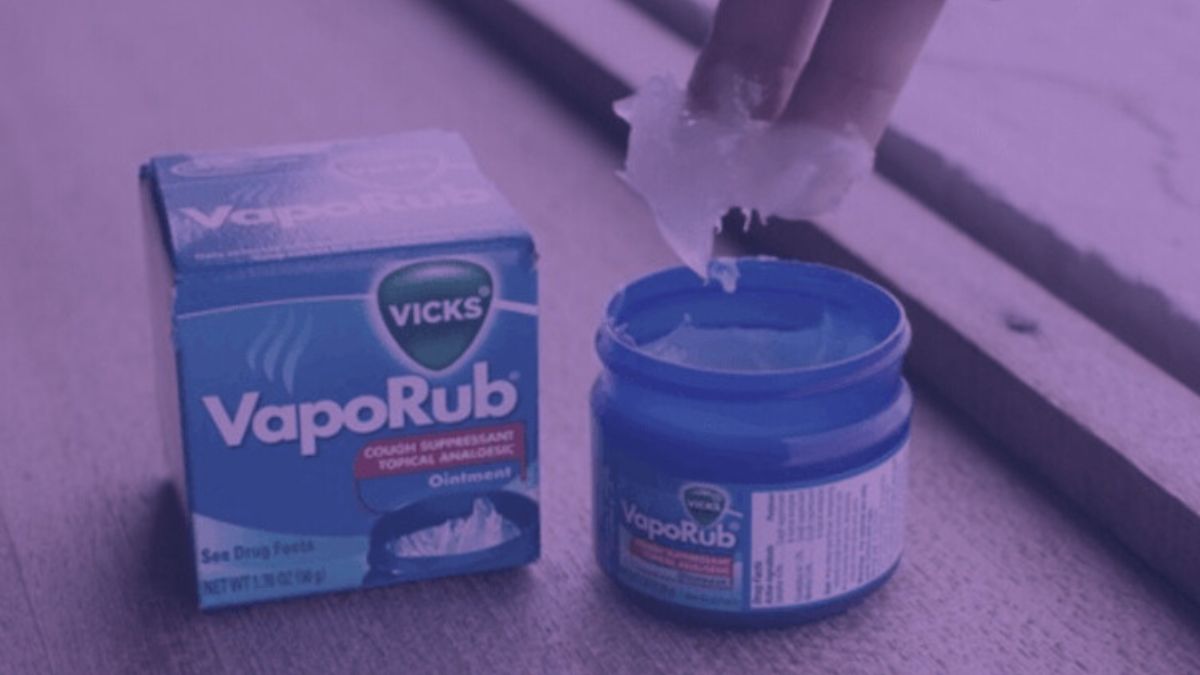
What Is Vicks VapoRub?
Vicks VapoRub is a topical ointment containing medicated vapors intended to be inhaled to relieve coughs and nasal congestion.
The main active ingredients inside the ointment are camphor, eucalyptus oil, and menthol, which contribute to the strong and unique smell of this topical analgesic.
Besides these three, Vicks VapoRub also contains several inactive ingredients, including:
- Cedar Leaf Oil: Has antiseptic properties that help prevent infection and promote healing.
- Nutmeg Oil: Has anti-inflammatory properties that help reduce swelling and redness.
- Special Petrolatum: This proprietary blend of mineral oils and waxes helps the ointment spread easily.
- Turpentine Oil: Has anti-inflammatory and pain-relieving properties.
- Thymol: A natural antiseptic commonly used in oral hygiene products to prevent infection and promote healing.
What Is Vicks VapoRub Used For?
Vicks VapoRub is used to relieve nasal congestion, suppress coughs, and soothe muscle and joint pain.
VapoRub’s ability to alleviate discomfort from cold-related symptoms largely hinges on its main ingredients.
Menthol, camphor, and eucalyptus oil have properties that produce a cooling effect, which can distract the brain from feeling aches and pains, providing temporary relief.
The menthol and eucalyptus oils also help open nasal passages, making breathing easier by alleviating congestion.
Further, the anti-inflammatory properties found within ingredients like turpentine and nutmeg oils can reduce swelling, aiding in the relief of muscle aches and pain.
These combined effects not only soothe the discomfort physically but also promote relaxation and improved sleep, which is essential for recovery during illness.
Can You Use Vicks On Acne?
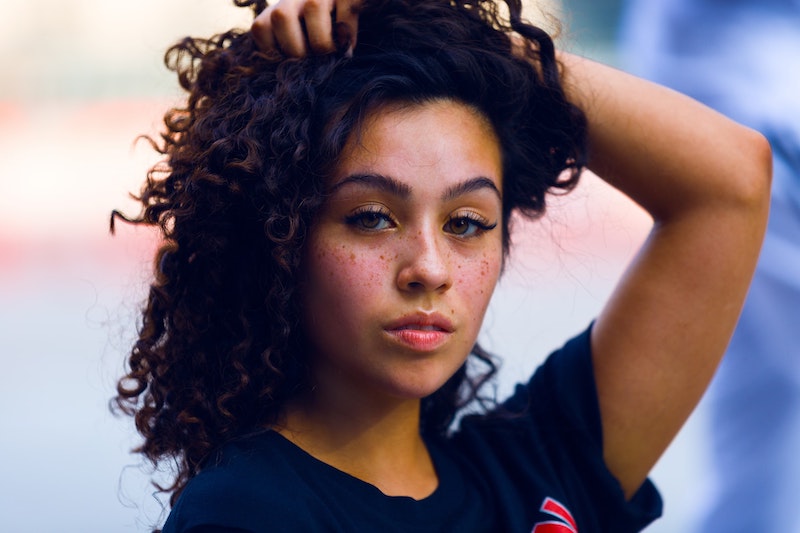
Vicks VapoRub is packed with soothing and anti-inflammatory ingredients, so it’s only natural that some people wonder if you can use Vicks on pimples and acne, which is another inflammatory condition.
However, while you can safely apply Vicks VapoRub to healthy skin, it’s not recommended to do so to broken or compromised skin with active acne, as it may exacerbate irritation and prolong the healing process.
Anecdotal evidence suggests that applying Vicks on an acne flare-up overnight might shrink zits by morning, as some of its ingredients are touted as antibacterial and anti-microbial pimple fighters.
However, while soothing for muscle and joint pain, ingredients like menthol and camphor can sensitize and irritate even healthy skin with prolonged use.
Menthol, known for its cooling sensation, doesn’t actually lower skin temperature but blocks the nerves responsible for temperature detection, indicating skin sensitization rather than soothing.
Additionally, high concentrations of menthol directly applied to the skin can lead to irritation or chemical burns, with the risk of these symptoms being significantly higher when the skin’s protective barrier is compromised, such as with inflamed acne.
Camphor, another key ingredient in Vicks VapoRub, also has a cooling effect but can cause skin sensitivity over time and instantly irritate already inflamed skin.
Furthermore, inhaling camphor in high concentrations or too frequently can cause mucous membranes and eye sensitivity on contact.
The last active ingredient in the Vicks VapoRub, eucalyptus oil, has some minor and meaningless benefits for the skin; however, due to its fragrant nature, it is also a potent skin sensitizer.
While eucalyptus oil poses a low risk in small amounts, it can still cause skin sensitization, especially for those with sensitive skin or anyone dealing with inflammatory skin conditions such as acne.
Finally, Vicks VapoRub’s thick, greasy base, primarily petrolatum, may benefit dry skin but can exacerbate oiliness and clog pores in oily skin, potentially leading to more acne.
The Side Effects of Using Vicks VapoRub for Acne
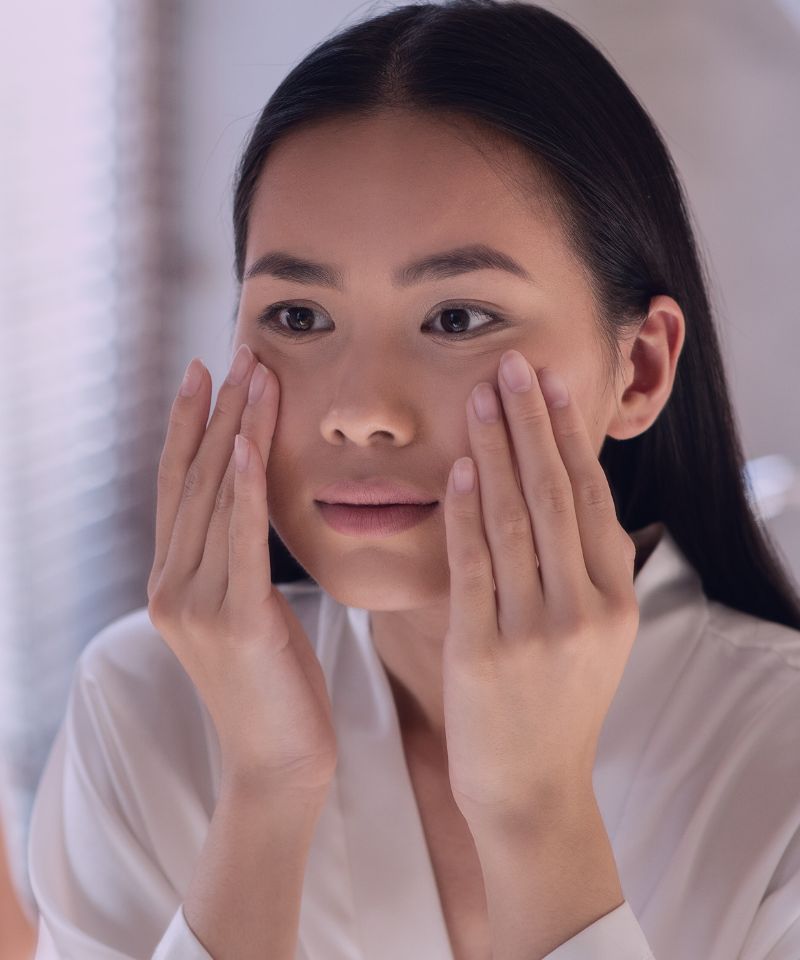
Applying Vicks VapoRub to acne can lead to several unwanted side effects, including:
Irritation and Redness:
The potent ingredients in Vicks VapoRub, like camphor and menthol, may cause skin irritation and prolonged redness, particularly on sensitive or inflamed skin.
Worsening of Acne:
The oily base of Vicks VapoRub can lead to further clogged pores, trapping bacteria and worsening acne breakouts.
Allergic Reactions:
Some individuals may experience allergic reactions due to the product’s eucalyptus oil or other fragrant components.
Skin Sensitization:
Over time, menthol and turpentine oil can sensitize the skin, making it more reactive to inflammation.
Chemical Burns:
In rare cases, the high concentration of active ingredients might lead to chemical burns, especially if used on broken or sensitive skin.
What To Use Instead of Vicks for Acne?
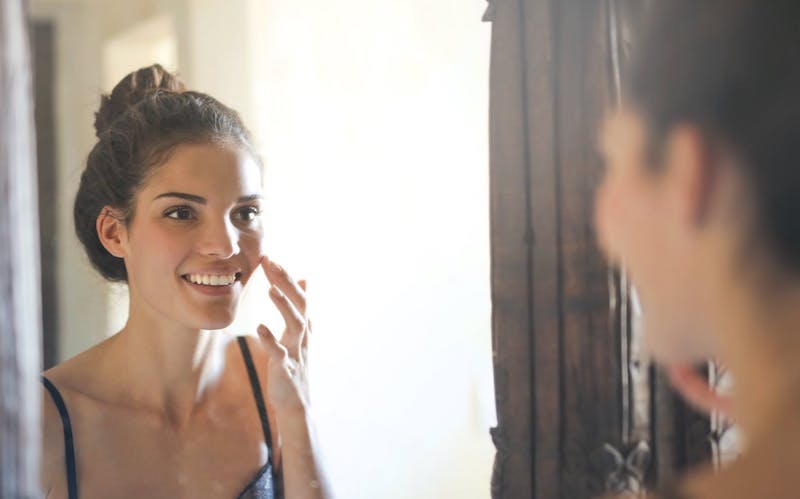
Here are several other ingredients that you may find significantly more useful when it comes to getting rid of acne:
Here are the five best toothpaste alternatives that are safe for the skin and effective in treating acne:
Benzoyl Peroxide
Benzoyl peroxide is a component found in cleansers, toners, gels, and creams that can help reduce the appearance of mild to moderate acne.
Many studies have proven benzoyl peroxide to have an oxygenating and, by extension, an antibacterial effect due to its ability to infuse the pores with oxygen and destroy the airless environment the acne-causing bacteria prefer to live in.
Additionally, benzoyl peroxide also has a keratolytic effect, which means it exfoliates or peels the outer layer of the skin.
This process helps unclog pores, reduce inflammation, and speed up the removal of dead skin cells, thereby preventing the buildup that can lead to acne breakouts.
However, despite its effectiveness, it’s important to note that benzoyl peroxide can cause dryness and irritation, especially at higher concentrations or when used too frequently.
Therefore, it should be used cautiously, in moderate amounts and frequencies, and should be a part of a complete skincare regimen to minimize potential adverse effects.
RELATED: Does Benzoyl Peroxide Cause Purging?
Salicylic Acid
Salicylic acid is a BHA and a multifunctional ingredient that addresses many of the systemic causes of acne.
Its primary benefit is as an exfoliant; however, it has the ability to penetrate the pore lining and dissolve the accumulated cellular debris inside the pore as well as on the surface of the skin, which makes it especially effective for reducing various types of acne, including whiteheads, blackheads, papules, pustules, and even cysts.
In addition to these benefits, salicylic acid also soothes aggravated skin, helps even out uneven skin tone, and hydrates the skin for a smoother, more refined texture.
Mandelic Acid
Mandelic acid is an alpha-hydroxy acid (AHA) effective in treating common skin problems, including inflammatory and non-inflammatory acne.
Mandelic acid has a larger molecular weight, which means it works primarily on the skin’s surface.
However, it can also dissolve cellular buildup near the opening of the pore and reduce the inflammation that’s causing acne.
Additionally, mandelic acid has fewer side effects than some stronger exfoliating acids and is also suitable for darker complexions that can sometimes react adversely to other acids.
Glycolic Acid
Glycolic acid is another alpha-hydroxy acid beneficial in treating various skin conditions, including both inflammatory and non-inflammatory acne.
With a smaller molecular weight and a water-soluble nature, which makes it best for working on the skin’s surface, glycolic acid aids in dissolving the bonds that hold dead skin cells together and encourages them to shed and make room for new, healthy cells underneath.
Additionally, glycolic acid has antibacterial properties, which make it effective at preventing the overgrowth of harmful bacteria on the skin and potential skin conditions.
Finally, while glycolic acid is a stronger exfoliating acid, it’s generally well-tolerated in low concentrations of up to 10%.
However, individuals with darker complexions should exercise caution as glycolic acid can cause unwanted discoloration.
Retinoids
Retinoids are a class of vitamin A derivatives known for their diverse array of skincare benefits.
The primary advantage of retinoids is their ability to accelerate skin cell turnover.
This means they help the skin shed dead cells more quickly and promote the growth of new ones, which results in less clogged pores and reduced acne, including more severe forms like nodules and cysts.
Apart from their acne-fighting abilities, retinoids also boost collagen production, which can improve the appearance of fine lines and wrinkles, as well as acne scarring, including atrophic scars and post-inflammatory hyperpigmentation.
However, despite these benefits, it’s important to note that retinoids are commonly associated with initial side effects such as dryness, peeling, and increased sensitivity to the sun.
Therefore, it’s recommended to use retinoids with caution and as a part of a complete skincare regimen that includes a gentle cleanser, a nourishing moisturizer, and a broad-spectrum sunscreen.
Looking for an Acne Solution that Works?
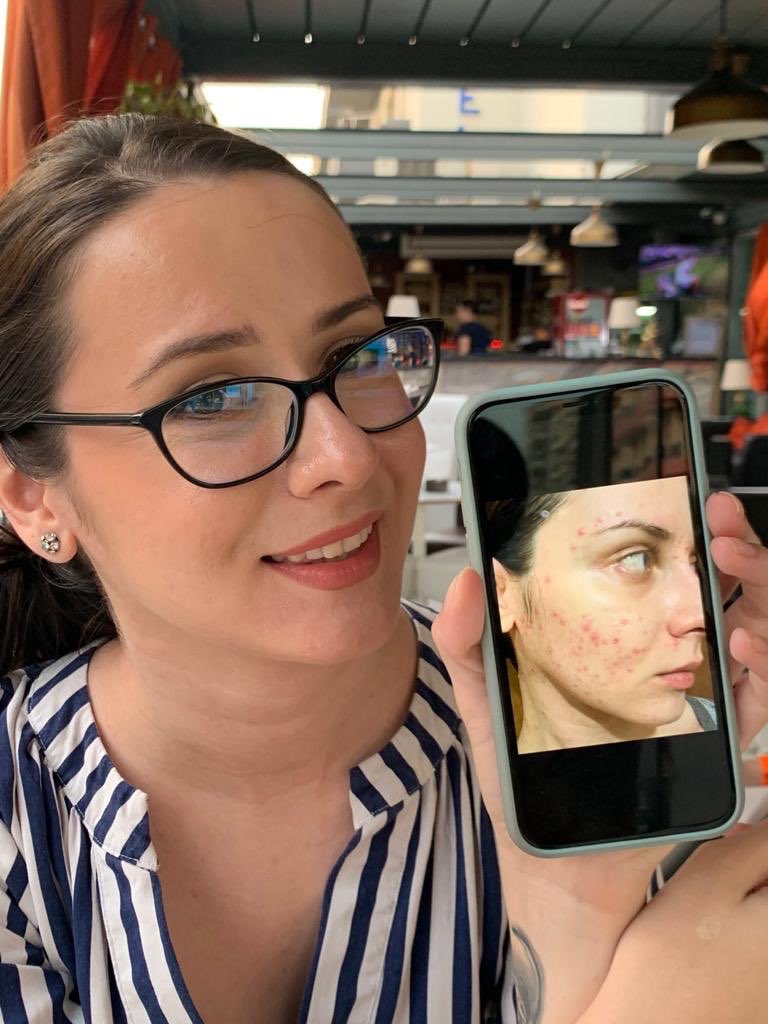
I understand the temptation to reach for quick fixes in the quest for clear, acne-free skin.
But when it comes to acne, not all remedies are created equal—and some, like Vicks, might do more harm than good.
My Acne Solution course is a scientifically backed, comprehensive program designed to tackle the root causes of acne and deliver the clear, flawless radiant skin you’ve always wanted.
If you’d like to get rid of acne once and for all…

My name is Simone and I am a certified skin specialist. I created this website to teach my readers how to take great care of their skin and I also like to occasionally share my honest opinions on skincare products I’ve tried. You can learn more about me here.
